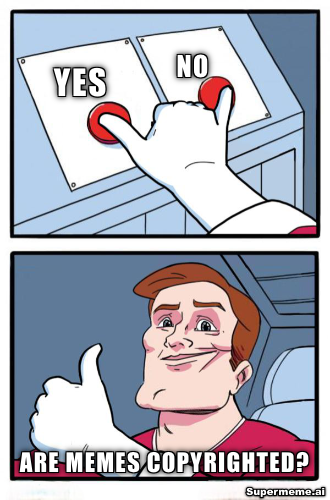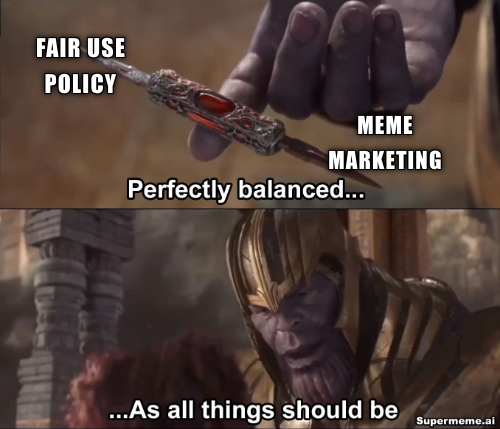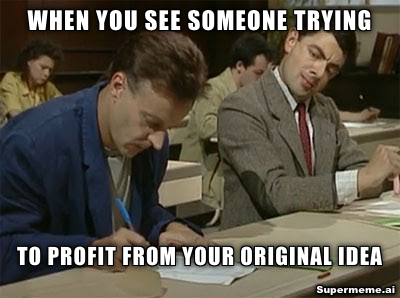Are Memes Copyrighted?
The answer is yes and no. It depends on the specific meme in question.
There is an exception to copyright infringement called "fair use." Fair use allows people to use copyrighted material in certain ways without getting permission from the copyright owner.

Generally speaking, using a meme for marketing purposes would likely fall under the category of fair use. After all, memes are often used to make commentary or criticize something, and using them for marketing simply extends that commentary to include the product or service being promoted.
Fair Use of Memes
There is an exception to copyright infringement called "fair use." Fair use allows people to use copyrighted material in certain ways without getting permission from the copyright owner.

When it comes to copyright law, there is a concept known as fair use. This allows for the use of copyrighted material for limited and "transformative" purposes, such as criticism, commentary, news reporting, or parody.
The law lists four factors that courts must consider when determining whether something is fair use:
- The purpose and character of the use, including whether the use is for commercial gain or is nonprofit educational.
- The nature of the copyrighted work.
- The amount and substantiality of the portion used in relation to the copyrighted work as a whole.
- The effect of the use upon the potential market for or value of the copyrighted work.
All four factors must be considered, but courts often give more weight to some factors than others. For example, courts have found that using a small amount of a copyrighted work is more likely to be fair use than using a large amount.
When is it not fair use?
There are some uses that courts have said are not fair use. These include:
- Uses that could serve as a market replacement for the original copyrighted work. For example, if you made a copy of a copyrighted photo to sell as a postcard, that would not be fair use because it would compete with the market for the original photo.
- Uses that unfairly harm the copyright owner's ability to make money from their copyrighted work. For example, if you scanned and posted someone else's comic book online without permission, that would be unfair because it would hurt the copyright owner's sales of the comic book.
Trying to steal original work won't be covered under fair use.

Mashups and parodies
Mashups and parodies are often protected by fair use because they transform the original copyrighted work into something new and creative. Courts have found that some mashups and parodies are fair use, and others are not.
For example, in 2015, a court found that a YouTube video that used clips from The Hunger Games was a fair use parody because it was "highly transformative" and did not damage the market for The Hunger Games films. But in 2007, another court found that an artist who created paintings based on photographs of celebrities had not created a fair use parody because the paintings were not "substantially different" enough from the originals.
Meme Copyright Checklist
While there are complications surrounding the legality of memes, it's not a reason to stay away from meme marketing because of this. There are many benefits to using memes in your marketing and you should definitely use it.
Just ensure that you read through the below checklist:
1. Is the meme popular?
If you're using a popular meme that's already been shared and going viral on the internet, you should be fine. Because it's kind of already become internet property. While the exact legality may be unclear, you're in good company because there's already thousands of memes being shared with the same template
2. Am I taking the meme template from a source?
This is a tricky area since you're creating the meme template. Be careful to ensure that you're not choosing the meme template from a private domain i.e personal photos, unreleased movies etc.
3. Is my meme template old?
If you're using a meme template from really old material (TV shows, movies), you're safe.
Try AI Meme Generator for free today
No Credit Card Required. Your first 10 AI memes are on us.
Meme Copyright Laws
It's important to understand that copyright law varies from country to country. In the United States, copyright law is governed by the Copyright Act of 1976. While this act doesn't specifically mention memes, it provides guidance on what can and cannot be copyrighted.
What can be copyrighted?
Under the Copyright Act of 1976, 'original works of authorship' can be eligible for copyright protection. This includes literary works, musical compositions, and artistic works. Memes typically fall into the category of artistic works.
Requirements for copyright protection
To be eligible for copyright protection, a work must be 'fixed in a tangible medium of expression.' This means the work must be stored in some physical or digital form that can be accessed and viewed by others. A meme that only exists in someone's mind would not be eligible for copyright protection.
Duration of copyright protection
Copyright protection is not perpetual. In the United States, it typically lasts for the life of the author plus 70 years. After this period expires, the work enters the public domain and can be used by anyone without obtaining permission from the copyright holder.
Are memes copyrighted?
Whether memes are copyrighted depends on various factors. If a meme meets all the criteria mentioned above, it could be eligible for copyright protection. However, it's important to note that copyright protection is neither automatic nor perpetual.
Frequently asked questions
Can't find the answer you're looking for? Reach out to our customer support team.
- What does copyright law have to do with memes?
- Copyright law protects original works of authorship, such as books, music, and art. When someone creates a meme, they're creating an original work that can be protected by copyright law.
- How can I protect my meme?
- If you've created a meme, the best way to protect it is to register it with the U.S. Copyright Office. There are two ways to do this: online or through the mail. The online registration process is faster and cheaper, but it requires you to upload your meme to the Copyright Office website. The mail registration process is a bit more expensive and takes longer, but it doesn't require you to upload your meme. Once your meme is registered, you'll have the exclusive right to use, reproduce, and distribute it. You can also sell or license your meme to others.
- What if someone steals my meme?
- If someone steals your meme, you can send them a cease and desist letter. This is a formal demand for them to stop using your meme. If they don't comply, you can take them to court.
- What if I want to use someone else's meme?
- If you want to use someone else's meme, you need to get their permission first. If they've registered their meme with the U.S. Copyright Office, you can find their contact information on the website. If they haven't registered their meme, you can try contacting them directly. Using someone else's meme without their permission is copyright infringement. If you're caught doing this, you could be fined or ordered to pay damages.
- Is using memes worth it with all the copyright issues?
- Yes and no. It depends on the meme you're using. If you're using popular memes, you're fine. You don't have to worry about anything. Avoid using memes that can land you in trouble.